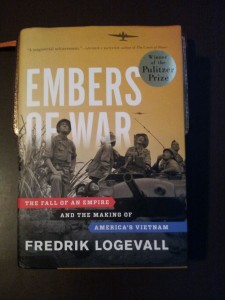Review of “Embers of War” by Fredrik Logevall
I just finished reading Frederik Logevall’s Embers of War: The Fall of an Empire and the Making of America’s Vietnam which won the Pulitzer Prize for History in 2012. A professor of history at Cornell, Logevall uses recently released diplomatic archives from several countries to paint a comprehensive portrait of the complexities of Vietnam’s place in international affairs from the end of World War Two up until the early 1960s and America’s assumption of primary responsibility in that region.
Embers of War is a great example of the historic principle that “things didn’t have to work out the way they did.” Ho Chi Minh was more of a Vietnamese nationalist that a committed communist and Franklin Roosevelt was adamantly opposed to the restoration of European empires in the post World War Two era. Ho, in fact, had great fondness for America. He believed our rhetoric. However, Roosevelt died and Truman was primarily concerned with confronting the Soviets in Europe. To keep the French on the right side of that struggle, Truman easily succumbed to France’s quest to restore its control over Indochina and soon made the United States the chief logistician and financier of France’s war against the Viet Minh.
America’s early support for the French was dispassionate but that all changed in 1948 when Mao Tse-Tung and his Communists prevailed in China. “The Democrats lost China” immediately became central to American domestic politics and the French shrewdly transformed their war to restore their empire into the front lines of the fight against the spread of Communism. Many American policy makers needed little convincing of that and those in the US who felt otherwise were frightened into silence by Joe McCarthy, Richard Nixon and their allies.
Soon the French concluded that Vietnam was a lost cause for them and they set out to extricate themselves as soon as possible. After so much rhetoric about the importance of a non-Communist Vietnam, America had little choice but to assume the role of the French although belief in American exceptionalism kept nearly everyone from foreseeing that history was simply repeating itself.
Logevall’s book is a fascinating new look at the start of America’s involvement in Vietnam. Although an academic, he doesn’t write like one and at times Embers of War takes on the quality of a “can’t put down” novel with an endless cast of amazing characters like Graham Greene, Edward Landsdale and Tom Dooley woven throughout.
The Vietnam War had a profound impact on Lowell, perhaps more so than in most other communities in America. Everyday places like Callery Park (William Callery, killed in action in 1966) and Arcand Drive (Donald Arcand, killed in action in 1965) are constant reminders of the impact that war had on Lowell. Beyond the memorials to the sacrifices of the city’s residents during the war, that conflict had an impact on Lowell far beyond what anyone could have imagined back in the 1960s and 1970s. The arrival of tens of thousands of refugees from Southeast Asia in the 1980s transformed the city. Today, those immigrants and their descendents make up at least a quarter of the city’s population. Their presence in the community has caused me, at least, to revisit the Vietnam War in search of a better understanding of events that set in motion the forces that made Lowell the city that it is today. To me, Embers of War is the best place to begin that query.

William Thomas, Callery was a good friend of mine who was killed in action on 2/22/1966 in VN. Bill was a draftee into the U.S.Army. He was a P.F.C. (E-3) . He was an infantryman (MOS 11B10) with A Co., 2 nd Bn., 18th Infantry, of the 1st Infantry Division . The Report of Casualty, DD 1300 dated 3 March 1966, states he died “as the result of a gunshot wound to the neck ” in Tay Ninh Province, South Viet nam. His unit was on a search and destroy operation in Boi Woods Feb. 22 to Feb.25, 1966. He is buried at St. Patrick Cemetery in Lowell, MA
Donald Leonard Arcand was a P.F.C.(E-3) in the U.S. Army when he died in Viet nam on 9/01/1965. He was the first to have died of 21 military personal to die in VN from Lowell,MA P.F.C. Arcand was a draftee, his was an infantryman (MOS- 11B20). He was stationed in Hawaii with Co. B ,1st Bn. (Mechanized) ,25th Infantry. He went to VN to the 197th Avn. Co. ,145th Avn. Bn., 12th Avn Group on TDY (temporary duty)for 90 days. The Report of Casualty, DD 1300, dated 8 September 1965, stated he died “as a result of extreme, multiple injuries. He was a (door)gunner aboard a UH-1B helicopter when the helicopter exploded in air.”